In each of my previous 2 posts concerning the New York domiciles of the cousins lucky enough to have been born the children of the eight Vanderbilt siblings, we focused on the offspring of one brother and one sister. My last post will cover the children of the four remaining siblings. This is no way to give them short shrift, but merely due to the fact that the third son, Frederick, had no children and the youngest brother George had but one child, a daughter Cornelia, who between Biltmore in Asheville, North Carolina, (the largest private home ever built in America), a mansion in Washington, D.C. and a flat in Paris, managed to get along just fine without a New York City base, which leaves us with the children of the two younger sisters.
Vivacious Emily Vanderbilt Sloane, neither as imperious nor as immensely rich as her older sister Florence, more than held her own in New York Society. Acknowledged as one of the leaders of the Four Hundred, she loved entertaining, her family, and all the material trappings of the gilded age. Thanks to her marriage to William Douglas Sloane her personal fortune grew substantially from the original $10 million left to her by her father, allowing her to never to have to worry about finances. When her two older daughters wed, she was able to build a pair of homes for them that put most of those built for their cousins to shame.
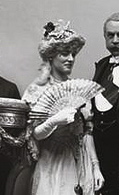 Her oldest daughter, formally named Florence Adele (seen above in costume for the James Hazen Hyde Ball), married James Abercrombie Burden Jr in 1895. Adele, as she was known (and very fortunately, as her husband was a cousin of her cousin Florence Adele Twombly’s husband Willam Burden, making them each Florence Adele Burden, which could tax all but the savviest of social secretaries) was popular, attractive and lively like her mother. She and her husband swiftly became leaders of the next generation’s smart set, no better illustrated than in 1924, when their Long Island Estate was the official residence of the Prince of Wales during his famous polo playing visit to the States that year. Adele’s mother Emily commissioned Warren and Wetmore (who also were designing the new Grand Central Station for the Vanderbilt’s) to design a mansion for the happy couple at 7 East 91st Street, today considered on of the finest examples of beaux arts architecture in the City. Most mansions of this era had reception areas on the ground floor, the principal entertaining spaces (with the highest ceilings) on the parlor floor or Piano Nobile above, followed by family living spaces and servants quarters on the successive floors, generally reflected from the street by a diminishment in scale and embellishment as one’s eye swept up the façade. The firm broke from the norm and ingeniously but quite commonsensically placed the family quarters immediately above the ground floor, creating an entresol between it and the public rooms for entertaining above, resulting in a lively façade with an architectural hierarchy both visually arresting and satisfying at the same time.
Her oldest daughter, formally named Florence Adele (seen above in costume for the James Hazen Hyde Ball), married James Abercrombie Burden Jr in 1895. Adele, as she was known (and very fortunately, as her husband was a cousin of her cousin Florence Adele Twombly’s husband Willam Burden, making them each Florence Adele Burden, which could tax all but the savviest of social secretaries) was popular, attractive and lively like her mother. She and her husband swiftly became leaders of the next generation’s smart set, no better illustrated than in 1924, when their Long Island Estate was the official residence of the Prince of Wales during his famous polo playing visit to the States that year. Adele’s mother Emily commissioned Warren and Wetmore (who also were designing the new Grand Central Station for the Vanderbilt’s) to design a mansion for the happy couple at 7 East 91st Street, today considered on of the finest examples of beaux arts architecture in the City. Most mansions of this era had reception areas on the ground floor, the principal entertaining spaces (with the highest ceilings) on the parlor floor or Piano Nobile above, followed by family living spaces and servants quarters on the successive floors, generally reflected from the street by a diminishment in scale and embellishment as one’s eye swept up the façade. The firm broke from the norm and ingeniously but quite commonsensically placed the family quarters immediately above the ground floor, creating an entresol between it and the public rooms for entertaining above, resulting in a lively façade with an architectural hierarchy both visually arresting and satisfying at the same time. Guests at the Burdens' many dinner parties and balls certainly didn’t mind spending a little a extra time ascending their sublime oval staircase
Guests at the Burdens' many dinner parties and balls certainly didn’t mind spending a little a extra time ascending their sublime oval staircase especially when greeted by the site of the gorgeous dining room and marble-clad ballroom, loosely based on the Galerie de Glaces at Versailles.
especially when greeted by the site of the gorgeous dining room and marble-clad ballroom, loosely based on the Galerie de Glaces at Versailles. Adele’s husband James passed away in 1932. Although she remained a fixture in New York social circles, she spent more and more time in Paris and at her estate in Syosset. With all of her children grown and no longer at home, keeping such a large establishment in the city seemed foolish. Remarried to Richard Tobin, Adele rented the mansion for a while but eventually auctioned off the contents, sold her home and took up residence in an apartment at 1 East 66th street, which she kept until her death in 1960.
Adele’s husband James passed away in 1932. Although she remained a fixture in New York social circles, she spent more and more time in Paris and at her estate in Syosset. With all of her children grown and no longer at home, keeping such a large establishment in the city seemed foolish. Remarried to Richard Tobin, Adele rented the mansion for a while but eventually auctioned off the contents, sold her home and took up residence in an apartment at 1 East 66th street, which she kept until her death in 1960.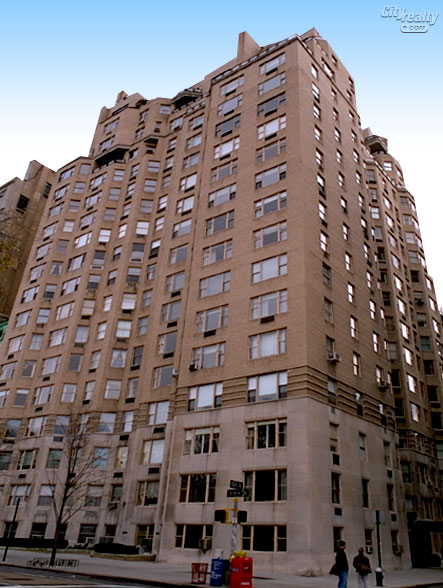 She left 7 East 91st in good hands though. Today her former home is well cared for by the Convent of the Sacred Heart, and is a popular spot for weddings and photoshoots.
She left 7 East 91st in good hands though. Today her former home is well cared for by the Convent of the Sacred Heart, and is a popular spot for weddings and photoshoots.
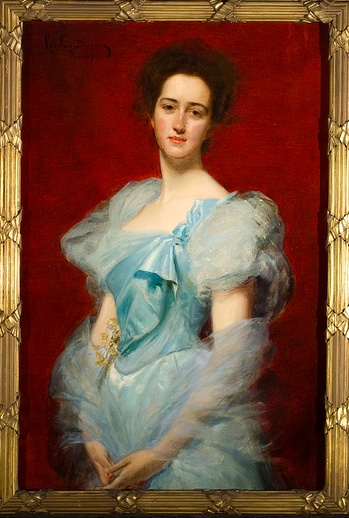 Adele’s younger sister Emily married John Henry Hammond in 1899. Her parents had the architectural firm of Carrere and Hastings design a majestic mansion for them at 9 East 91st.
Adele’s younger sister Emily married John Henry Hammond in 1899. Her parents had the architectural firm of Carrere and Hastings design a majestic mansion for them at 9 East 91st.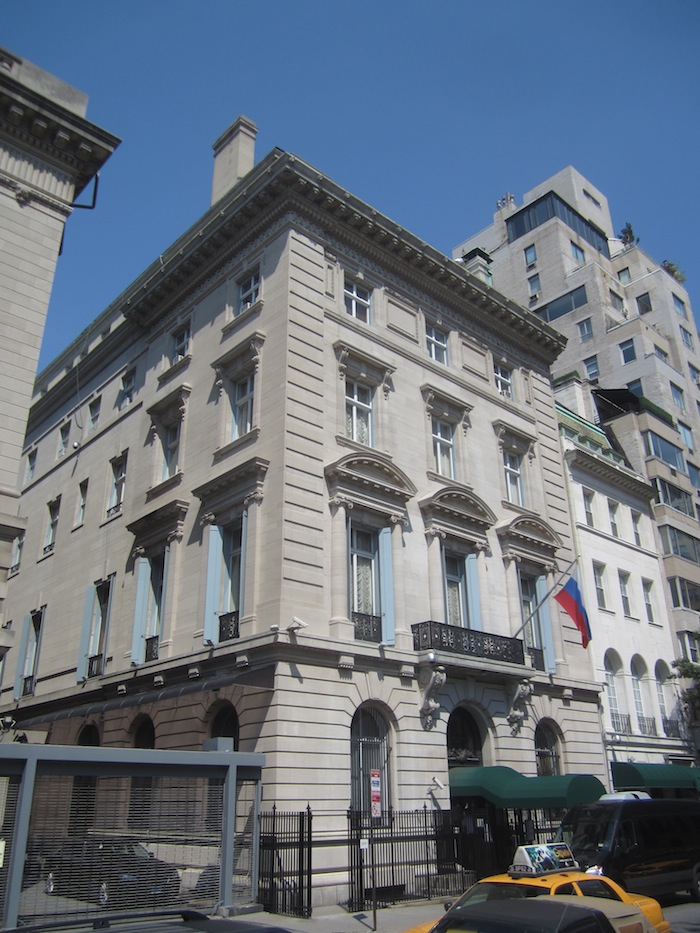 While not as hyper-social as their sister and next door neighbor, Emily’s family loved music (son John Henry Hammond became a legendary jazz impresario, talent spotter, critic, record producer and daughter Alice married Benny Goodman. Emily’s white and gold music room was often filled with as many guests as Adele’s marble ballroom, coming for the musicales and concerts performed there (often by members of the family).
While not as hyper-social as their sister and next door neighbor, Emily’s family loved music (son John Henry Hammond became a legendary jazz impresario, talent spotter, critic, record producer and daughter Alice married Benny Goodman. Emily’s white and gold music room was often filled with as many guests as Adele’s marble ballroom, coming for the musicales and concerts performed there (often by members of the family).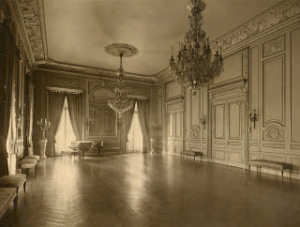 The Hammonds remained in the home until after World War 2, when they sold the mansion and bucking the trend of their generation, moved into another townhouse, albeit a much smaller on at 134 East 64th Street, which Emily owned at the time of her death in 1970.
The Hammonds remained in the home until after World War 2, when they sold the mansion and bucking the trend of their generation, moved into another townhouse, albeit a much smaller on at 134 East 64th Street, which Emily owned at the time of her death in 1970.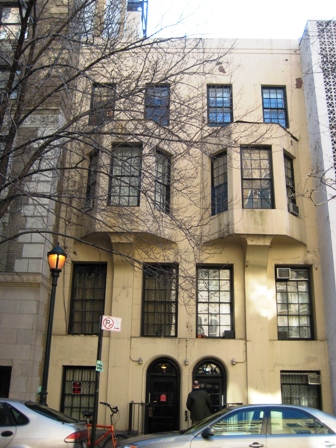
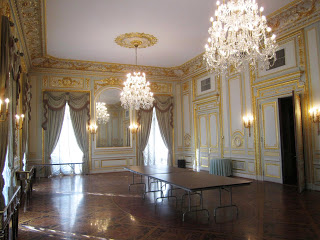
 The Sloanes youngest and some said Emily’s favorite daughter Lila married William Osgood Field in 1902. Ironically, the Sloanes did not have a spectacular Mansion built for the young couple. Instead, they purchased one of the Marble Twins at 645 Fifth Avenue, built by Emily’s brother George Vanderbilt, to serve the young couple’s Manhattan residence.
The Sloanes youngest and some said Emily’s favorite daughter Lila married William Osgood Field in 1902. Ironically, the Sloanes did not have a spectacular Mansion built for the young couple. Instead, they purchased one of the Marble Twins at 645 Fifth Avenue, built by Emily’s brother George Vanderbilt, to serve the young couple’s Manhattan residence. This also happened to be conveniently located directly across the avenue from Emily’s own massive home at 2 West 52nd Street (lest one feel the Field’s got the short end of the stick, they also received Highlawn, a huge Lenox estate from her parents). The Fields owned the home (although they stopped living there sometime in the early 1920’s) until Lila died in 1934, after which it was sold to developers who promptly razed it. Fortunately its twin at 647 Fifth Avenue, survives today as the Versace store.
This also happened to be conveniently located directly across the avenue from Emily’s own massive home at 2 West 52nd Street (lest one feel the Field’s got the short end of the stick, they also received Highlawn, a huge Lenox estate from her parents). The Fields owned the home (although they stopped living there sometime in the early 1920’s) until Lila died in 1934, after which it was sold to developers who promptly razed it. Fortunately its twin at 647 Fifth Avenue, survives today as the Versace store.
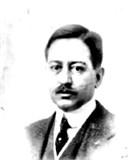 The Sloane’s one son, Malcom Douglas, quietly married Elinor Lee in 1915. Whether because his father had recently died, or perhaps because he was of a more modern mold, the couple did not receive a townhouse, instead they started married life in an apartment at 521 Park Avenue, on the corner of 60th street.
The Sloane’s one son, Malcom Douglas, quietly married Elinor Lee in 1915. Whether because his father had recently died, or perhaps because he was of a more modern mold, the couple did not receive a townhouse, instead they started married life in an apartment at 521 Park Avenue, on the corner of 60th street.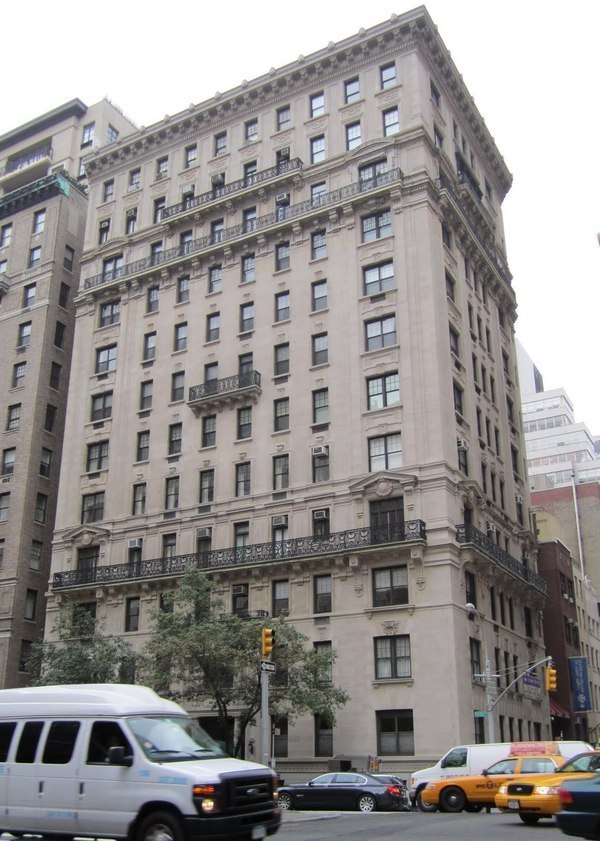 When Malcom died less than a decade later in 1924 (the men of his generation tended to have much shorter lives than their female relatives), the couple was living at the Montana apartments at 375 Park Avenue,
When Malcom died less than a decade later in 1924 (the men of his generation tended to have much shorter lives than their female relatives), the couple was living at the Montana apartments at 375 Park Avenue, an address better known today as the location of the Seagram building.
an address better known today as the location of the Seagram building.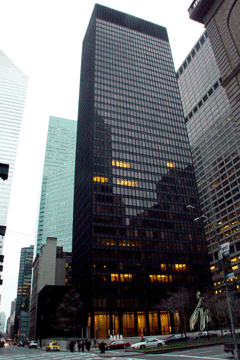
The youngest of William Henry’s eight children was his daughter Eliza (known as Lila), who married William Seward Webb in 1881. Like her eldest sister Margaret, Lila’s husband managed to spend most of the money she had inherited, leaving her with only the income from a 5 million dollar trust to live on. Unlike her sister Margaret, the Webbs continued to operate several very large expensive establishments in addition to their New York residence; Shelburne Farms, an agricultural estate on over a thousand acres in Vermont, a Great Camp in the Adirondacks, and a Palm Beach mansion, which all together ate up a good deal of Lila’s annual income. When it came time for her children to marry she couldn’t afford to start them off with a gift of a mansion like her sisters. That didn’t stop the two eldest though, thanks to advantageous marriages.
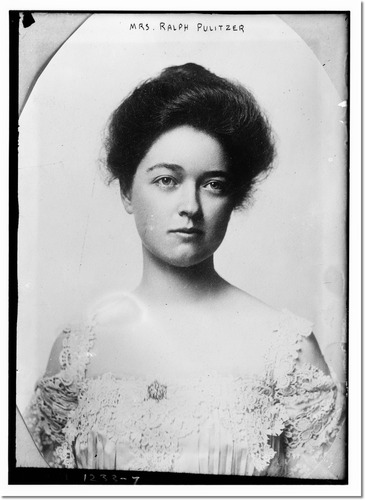 When the Webbs only daughter Frederica married Ralph Pulitzer in 1905, his father Joseph gave the couple a townhouse at 17 East 73rd street, adjacent to his own famous mansion
When the Webbs only daughter Frederica married Ralph Pulitzer in 1905, his father Joseph gave the couple a townhouse at 17 East 73rd street, adjacent to his own famous mansion (Frederica's newly married cousin Florence Twombly Burden occupied the mansion immediately to the west of her father-in-law’s at 5 East 73rd Street, helping to keep family balance on the block).
(Frederica's newly married cousin Florence Twombly Burden occupied the mansion immediately to the west of her father-in-law’s at 5 East 73rd Street, helping to keep family balance on the block).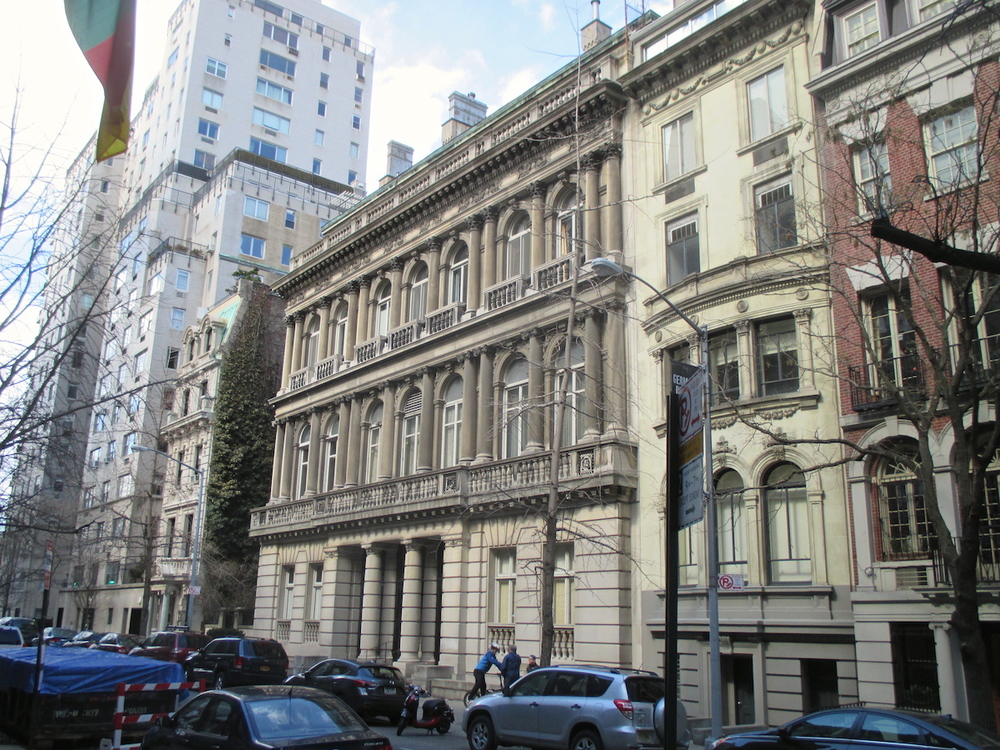
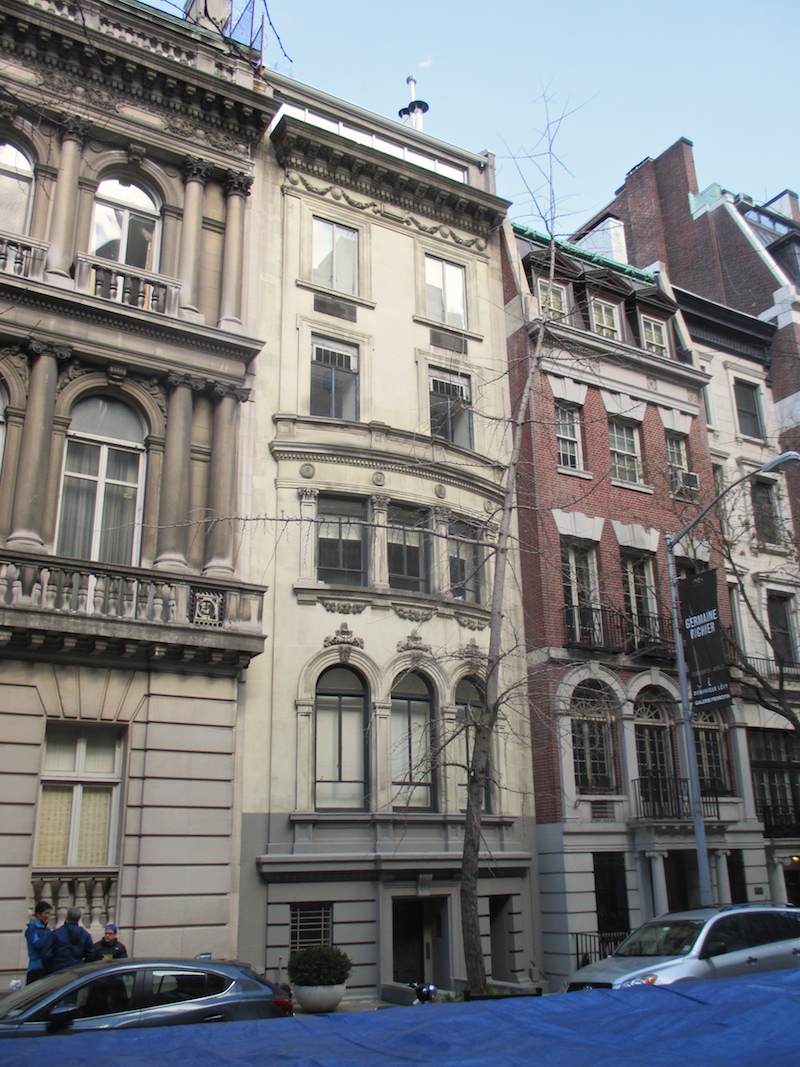 Her former house here survives to this day.
Her former house here survives to this day.
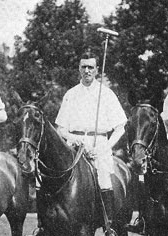 The Webb’s eldest son James Watson (seen here in 1921 as part of the American polo team) married Electra Havemeyer, heiress to the immense sugar fortune. Her parents gave the couple a townhouse at 852 Fifth Avenue, adjacent to and whose exterior almost seamlessly blended in with with their famous art-filled, tiffany-decorated mansion at 1 East 66th Street.
The Webb’s eldest son James Watson (seen here in 1921 as part of the American polo team) married Electra Havemeyer, heiress to the immense sugar fortune. Her parents gave the couple a townhouse at 852 Fifth Avenue, adjacent to and whose exterior almost seamlessly blended in with with their famous art-filled, tiffany-decorated mansion at 1 East 66th Street.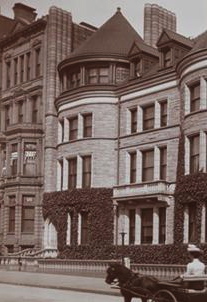 The Havemeyer’ also built a house for Electra’s brother and his wife at 853 Fifth Avenue, creating a mini-urban family compound. In 1930, although the Havemeyer fortune was secure, the family could not afford to turn down a $25 million lease, offered by a real estate syndicate for the combined three properties, which almost immediately razed the three mansions and erected an apartment building at 1 East 66th Street (which in turn was torn down in the 1940’s to make way for a larger apartment building, where the Webb’s cousin Adele eventually lived). James and Electra took their share of the windfall and purchased an apartment at 740 Park Avenue, known as one of the toniest buildings in New York.
The Havemeyer’ also built a house for Electra’s brother and his wife at 853 Fifth Avenue, creating a mini-urban family compound. In 1930, although the Havemeyer fortune was secure, the family could not afford to turn down a $25 million lease, offered by a real estate syndicate for the combined three properties, which almost immediately razed the three mansions and erected an apartment building at 1 East 66th Street (which in turn was torn down in the 1940’s to make way for a larger apartment building, where the Webb’s cousin Adele eventually lived). James and Electra took their share of the windfall and purchased an apartment at 740 Park Avenue, known as one of the toniest buildings in New York.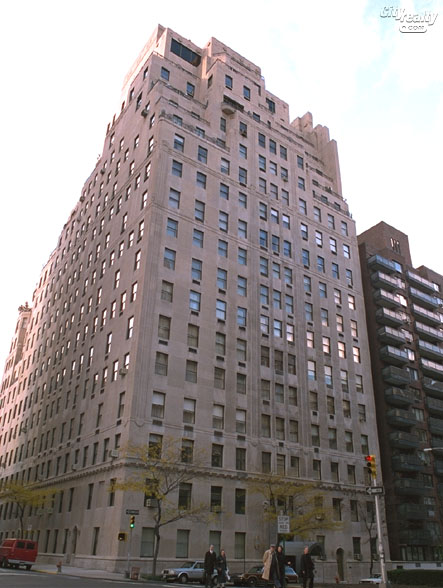 Here they remained until the end of their days, when not at their estate in Shelburne Vermont (originally a portion of his parents), or their home in Old Westbury.
Here they remained until the end of their days, when not at their estate in Shelburne Vermont (originally a portion of his parents), or their home in Old Westbury.
 William Seward Webb Jr the second son (shown here at te time of his daughter's wedding circa 1930), eloped with Gertrude Gaynor, the daughter of New York’s then mayor in 1911. Although he went on to become a successful New York real estate developer (selling his interests to the Zeckendorf firm in the 1930’s), there are few records of Seward and his family owning a residence there. In 1912, when the couple’s first child was born, they were listed as living with his parents at 680 Fifth Avenue.
William Seward Webb Jr the second son (shown here at te time of his daughter's wedding circa 1930), eloped with Gertrude Gaynor, the daughter of New York’s then mayor in 1911. Although he went on to become a successful New York real estate developer (selling his interests to the Zeckendorf firm in the 1930’s), there are few records of Seward and his family owning a residence there. In 1912, when the couple’s first child was born, they were listed as living with his parents at 680 Fifth Avenue.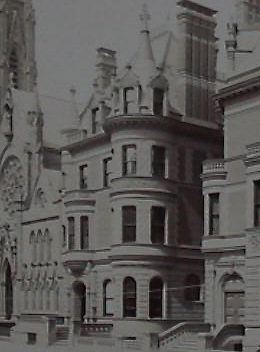 They couldn’t have remained there long, as the mansion was sold to John D Rockefeller in 1913. Although it is very likely they kept an apartment in New York, at the time of one of their childrens’ marriage in 1933 the couple’s residences were listed as Manhasset and Palm Beach.
They couldn’t have remained there long, as the mansion was sold to John D Rockefeller in 1913. Although it is very likely they kept an apartment in New York, at the time of one of their childrens’ marriage in 1933 the couple’s residences were listed as Manhasset and Palm Beach.
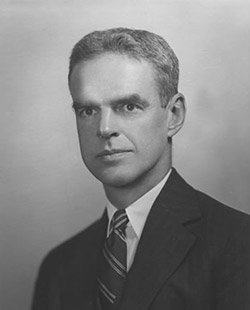 Vanderbilt, the youngest of the Webb’s children, married Aileen Osborn in 1912. The couple has always been more famously associated with both Shelburne Farms (Vanderbilt having bought out his siblings shares after their parents’ deaths, and their estate in Garrison, NY where Aileen became known as a huge proponent of American crafts). They also kept a Manhattan apartment as a base however. When Vanderbilt Webb died in 1956, his residence was listed as 66 East 79th Street.
Vanderbilt, the youngest of the Webb’s children, married Aileen Osborn in 1912. The couple has always been more famously associated with both Shelburne Farms (Vanderbilt having bought out his siblings shares after their parents’ deaths, and their estate in Garrison, NY where Aileen became known as a huge proponent of American crafts). They also kept a Manhattan apartment as a base however. When Vanderbilt Webb died in 1956, his residence was listed as 66 East 79th Street.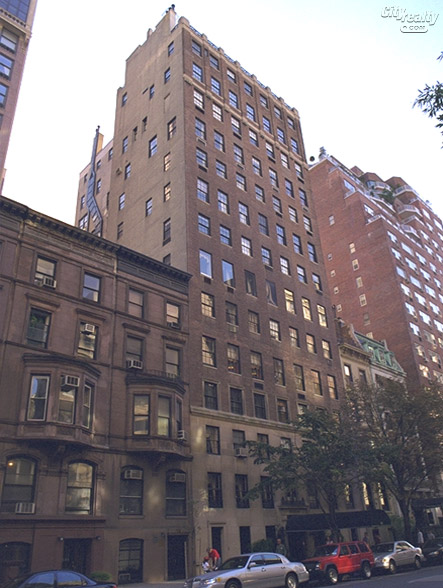
And thus concludes my examination of the 21 Vanderbilt Cousin’s homes. Although some of them had children who also had well known Manhattan lives and abodes, like Gloria Vanderbilt and Cornelius Vanderbilt Whitney, they were the last Vanderbilt generation who by and large made New York their principal home, and thank god they did!
For more in depth reading on some of these homes or related ones, I suggest one of the following links; Daytonian in Manhattan, Big Old Houses, or Beyond the Gilded Age
